Gardener Forestdale: Cultivating Green Spaces in Your Community
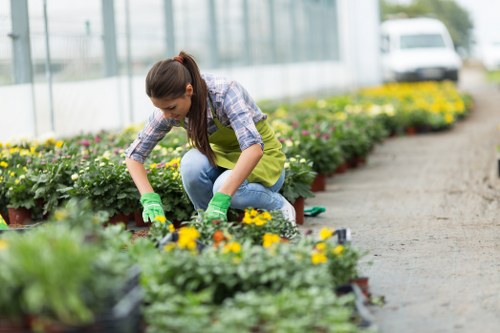
Forestdale is a vibrant community where gardening plays a pivotal role in enhancing the beauty and sustainability of the area. Whether you’re a seasoned gardener or just starting out, Forestdale offers a plethora of resources and opportunities to cultivate your green thumb.
Local gardeners in Forestdale take pride in their lush gardens, which not only add aesthetic value but also promote environmental well-being. From community gardens to private backyards, the passion for gardening is evident throughout the region.
One of the key factors contributing to successful gardening in Forestdale is the favorable climate. The area experiences mild temperatures and adequate rainfall, creating ideal conditions for a wide variety of plants to thrive.
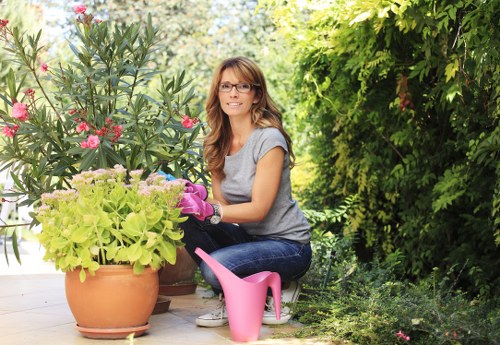
The Benefits of Gardening in Forestdale
Gardening in Forestdale offers numerous benefits that extend beyond just having a beautiful outdoor space.
Physical Health: Gardening is a great way to stay active. It involves various activities such as digging, planting, and weeding, which can improve strength and flexibility.
Mental Well-being: Engaging with nature has been shown to reduce stress and enhance mood. The act of tending to plants can be therapeutic and provide a sense of accomplishment.
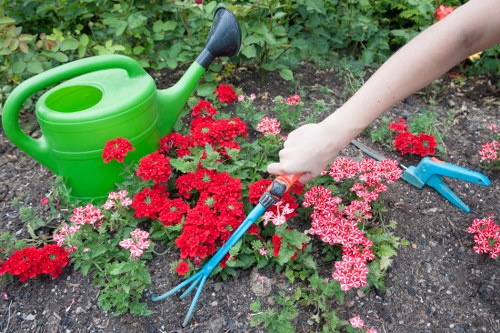
Community Gardens: A Hub for Local Interaction
Forestdale boasts several community gardens where residents can collaborate and share their gardening experiences. These gardens serve as social hubs, fostering a sense of community and cooperation among neighbors.
In these shared spaces, gardeners exchange tips, harvests, and stories, creating a supportive environment for both new and experienced gardeners.
Community gardens also promote biodiversity, as a variety of plants attract different pollinators and beneficial insects, contributing to a healthier ecosystem.
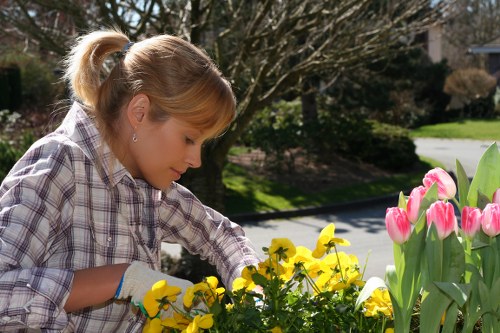
Choosing the Right Plants for Forestdale
Selecting appropriate plants is crucial for a thriving garden in Forestdale. Here are some recommendations:
- Perennials: Plants like lavender and peonies are hardy and return year after year.
- Vegetables: Tomatoes, peppers, and herbs are popular choices for home gardens.
- Native Plants: Incorporating native species like black-eyed Susans and coneflowers supports local wildlife.
Understanding the local soil conditions and sunlight patterns can help in making informed decisions about plant selection.
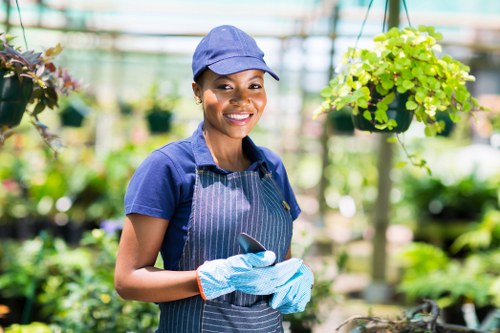
Gardening Techniques for Success
Implementing effective gardening techniques can enhance plant growth and garden productivity.
Companion Planting: Growing certain plants together can deter pests and improve growth. For example, basil planted alongside tomatoes can enhance flavor and repel insects.
Mulching: Applying mulch helps retain soil moisture, suppress weeds, and regulate soil temperature.
Seasonal Gardening in Forestdale
Adjusting gardening practices according to the seasons ensures year-round garden health.
Spring: Focus on planting new seeds and preparing garden beds. It’s also a great time to prune trees and shrubs.
Summer: Maintain consistent watering and manage pests. Harvesting season begins for many vegetables and fruits.
Autumn and Winter Care
Proper care during the cooler months sets the stage for a successful next growing season.
In autumn, clean up garden debris and plant bulbs for early spring blooms. Winterizing your garden involves protecting sensitive plants from frost and reducing water usage.
Using cover crops can enrich the soil and prevent erosion during the off-season.
Local Gardening Resources in Forestdale
Forestdale offers various resources to support local gardeners.
- Nurseries: Local nurseries provide a wide range of plants, tools, and expert advice.
- Workshops: Educational workshops cover topics like organic gardening, composting, and landscape design.
- Community Groups: Joining local gardening clubs can connect you with fellow enthusiasts and provide additional learning opportunities.
Leveraging these resources can enhance your gardening experience and success.
Eco-Friendly Gardening Practices
Adopting sustainable gardening practices benefits both your garden and the environment.
- Composting: Recycling kitchen and garden waste into compost enriches the soil and reduces landfill waste.
- Rainwater Harvesting: Collecting rainwater for irrigation conserves water and lowers utility bills.
- Organic Pest Control: Using natural remedies and encouraging beneficial insects minimizes the need for chemical pesticides.
Implementing these practices promotes a healthier, more sustainable garden.
Gardening Events and Activities
Forestdale hosts numerous events that celebrate gardening and bring the community together.
Annual Flower Shows: These events showcase the best local gardens and provide inspiration for gardeners of all levels.
Plant Sales: Seasonal plant sales offer a variety of healthy, locally-grown plants at affordable prices.
Workshops and Seminars: Educational sessions on topics like organic gardening, landscape design, and plant care are regularly held.
Gardening Competitions
Friendly competitions encourage gardeners to showcase their skills and creativity.
Categories typically include best vegetable garden, most beautiful flower arrangement, and most innovative gardening technique.
Participating in these competitions can provide recognition and motivate gardeners to enhance their gardening practices.
Gardening Challenges in Forestdale
While gardening in Forestdale is rewarding, it comes with its own set of challenges.
Pest Management: Controlling pests without harming beneficial insects requires careful planning and natural solutions.
Soil Quality: Maintaining healthy soil through regular testing and supplementation is essential for plant growth.
Water Management: Ensuring plants receive adequate water without overwatering is crucial, especially during dry spells.
Solutions to Common Gardening Problems
Addressing common issues can help maintain a thriving garden.
- Integrated Pest Management (IPM): Combining biological, cultural, and physical control methods to manage pests sustainably.
- Soil Amendments: Adding compost, manure, or organic fertilizers can improve soil structure and fertility.
- Efficient Irrigation: Using drip irrigation systems ensures plants receive the right amount of water directly to their roots.
Implementing these solutions enhances garden resilience and productivity.
Technological Advancements in Gardening
Modern technology offers innovative tools that simplify and enhance gardening tasks.
Smart Irrigation Systems: Automated systems adjust watering schedules based on weather conditions, conserving water and ensuring optimal plant hydration.
Garden Apps: Mobile applications provide gardening tips, plant identification, and tracking tools to help gardeners manage their gardens more effectively.
LED Grow Lights: These lights enable year-round cultivation by providing the necessary light spectrum for plant growth, especially in low-light environments.
Urban Gardening Solutions
For those with limited space, urban gardening offers creative ways to grow plants in small areas.
Vertical Gardens: Utilizing vertical space with wall-mounted planters maximizes growing area without taking up floor space.
Container Gardening: Growing plants in containers allows flexibility and mobility, making it ideal for balconies and patios.
Rooftop Gardens: Transforming rooftops into green spaces provides additional growing areas and contributes to urban sustainability.
Local Flora and Fauna
Forestdale is home to a diverse range of plant and animal species that coexist harmoniously.
Native plants like the red maple and Eastern bluebird attract various pollinators, including bees and butterflies, which are essential for plant reproduction.
Maintaining biodiversity in gardens supports ecosystem health and resilience against pests and diseases.
Native vs. Non-Native Plants
Choosing between native and non-native plants impacts the local ecosystem.
Native Plants: Adapted to the local climate, they require less maintenance and provide habitat for native wildlife.
Non-Native Plants: While they can add variety, they may require more resources and could potentially become invasive.
Balancing both types can create a diverse and sustainable garden.
Gardening for All Ages
Gardening is an activity that can be enjoyed by people of all ages in Forestdale.
Children: Introducing gardening to children fosters a connection with nature and teaches responsibility.
Adults: Gardening serves as a relaxing hobby that can reduce stress and provide physical exercise.
Seniors: For older adults, gardening offers gentle physical activity and social interaction if done in community gardens.
Accessible Gardening Practices
Ensuring gardening is accessible to everyone involves adapting practices and tools.
- Raised Beds: These make gardening easier for individuals with mobility issues.
- Ergonomic Tools: Tools designed for ease of use reduce strain and prevent injury.
- Inclusive Garden Designs: Creating spaces that are navigable and enjoyable for all abilities fosters inclusivity.
Embracing accessibility in gardening ensures everyone can participate and benefit from this rewarding activity.
Gardening Sustainability in Forestdale
Sustainable gardening practices help preserve the environment and ensure resources are available for future generations.
Resource Conservation: Using water-efficient irrigation systems and recycled materials conserves essential resources.
Soil Health: Maintaining healthy soil through organic practices reduces the need for chemical fertilizers and promotes long-term fertility.
Biodiversity: Encouraging a variety of plant species supports diverse ecosystems and resilience against environmental changes.
Composting and Waste Reduction
Composting transforms organic waste into valuable soil amendment, reducing landfill usage and enhancing soil health.
- Kitchen Scraps: Composting vegetable peels, coffee grounds, and eggshells recycles nutrients back into the garden.
- Garden Waste: Leaves, grass clippings, and plant trimmings can be composted to enrich the soil.
- Compost Bins: Using compost bins or piles efficiently manages organic waste and accelerates decomposition.
Implementing composting practices benefits both the garden and the environment.
Gardening Education and Outreach
Educating the community about gardening fosters a culture of sustainability and appreciation for nature.
Schools in Forestdale incorporate gardening programs to teach students about plant biology, ecology, and responsibility.
Public workshops and seminars provide adults with the knowledge and skills needed to maintain successful gardens.
Volunteer Opportunities
Volunteering in community gardens and local green projects allows residents to give back while honing their gardening skills.
These opportunities also strengthen community bonds and promote collective environmental stewardship.
Participating in tree planting events, garden clean-ups, and educational programs enriches both the volunteer and the community.
Gardening Tools and Equipment
Having the right tools is essential for efficient and enjoyable gardening.
- Hand Tools: Trowels, pruners, and hoes are basic tools every gardener should have.
- Power Tools: Electric or battery-powered tools like lawnmowers and tillers save time and effort.
- Protective Gear: Gloves, hats, and protective eyewear ensure safety while gardening.
Investing in quality tools enhances the gardening experience and longevity.
Innovative Gardening Solutions
Exploring innovative solutions can address common gardening challenges.
Hydroponics: Growing plants without soil using nutrient-rich water solutions saves space and resources.
Aeroponics: This method involves growing plants in an air or mist environment, promoting rapid growth.
Vertical Farming: Maximizing vertical space increases plant density and yields, ideal for limited areas.
Gardening Success Stories in Forestdale
Many residents have transformed their spaces into thriving gardens, inspiring others to follow suit.
Success stories often highlight the positive impact of gardening on personal well-being and community aesthetics.
Sharing these stories fosters a supportive environment where gardeners encourage and motivate each other.
Inspirational Gardens
Beautiful gardens in Forestdale serve as inspiration for both novice and experienced gardeners.
- The Rose Garden: Known for its diverse collection of roses, this garden attracts visitors year-round.
- Herb Sanctuary: A dedicated space for medicinal and culinary herbs, offering educational tours.
- Pioneer Garden: Showcases native plants and sustainable gardening practices.
Visiting these gardens provides ideas and motivation for personal gardening projects.
Gardening Trends in Forestdale
Staying updated with the latest gardening trends keeps your garden modern and efficient.
Vertical Gardening: Maximizing space through vertical planting structures.
Edible Landscaping: Integrating food-producing plants into ornamental landscapes.
Native Plant Gardens: Emphasizing the use of native species for sustainability and low maintenance.
Sustainable Landscaping
Adopting sustainable landscaping practices reduces environmental impact and enhances garden resilience.
- Xeriscaping: Designing gardens that require minimal water.
- Rain Gardens: Creating depressions that absorb rainwater, preventing runoff and erosion.
- Green Roofs: Incorporating plants into roofing systems for insulation and biodiversity.
Sustainable landscaping contributes to a healthier environment and more efficient resource use.
Gardening for Wildlife
Creating a wildlife-friendly garden supports local fauna and enhances biodiversity.
Pollinator Gardens: Planting flowers that attract bees, butterflies, and other pollinators is crucial for ecosystem health.
Bird Habitats: Installing bird feeders, baths, and nesting boxes encourages bird populations.
Insect Hotels: Providing shelters for beneficial insects helps maintain natural pest control.
Creating Natural Habitats
Designing gardens to mimic natural habitats promotes a balanced ecosystem.
- Wildflower Meadows: Planting native wildflowers provides food and habitat for various species.
- Pond Ecosystems: Adding water features supports aquatic life and attracts amphibians.
- Leaf Litter: Leaving fallen leaves creates a natural ground cover that benefits soil health and organisms.
Implementing these elements fosters a thriving environment for wildlife in your garden.
Local Gardening Regulations
Understanding local regulations ensures that your gardening practices comply with community standards.
Forestdale may have specific guidelines regarding water usage, plant selection, and garden structures.
Adhering to these regulations promotes harmonious living and environmental stewardship within the community.
Permits and Restrictions
Some gardening projects, such as building large structures or altering landscapes, may require permits.
Consulting with local authorities before starting such projects prevents potential issues and ensures compliance.
Being aware of any restrictions, such as plant species limitations, helps maintain the ecological balance of the area.
Gardening Inspiration Sources
Finding inspiration for your garden enhances creativity and enjoyment.
Sources of inspiration include visiting public gardens, browsing gardening magazines, and participating in online gardening communities.
Documenting your gardening journey through photos and journals can also provide creative insights and track your progress.
Online Gardening Resources
The internet offers a wealth of information and inspiration for gardeners.
- Gardening Blogs: Personal experiences and tips from fellow gardeners.
- Social Media: Platforms like Instagram and Pinterest showcase beautiful garden images and ideas.
- Online Courses: Structured lessons on various gardening topics are accessible to all skill levels.
Utilizing these resources can broaden your knowledge and spark new gardening ideas.
Gardening and Mental Health
Gardening has significant positive effects on mental health, providing a therapeutic outlet for stress relief and emotional well-being.
Engaging in gardening activities promotes mindfulness, allowing individuals to focus on the present moment and disconnect from daily stressors.
The sense of accomplishment from nurturing plants and witnessing their growth fosters confidence and a positive mindset.
Therapeutic Gardening Programs
Forestdale offers therapeutic gardening programs for individuals dealing with mental health challenges.
These programs incorporate horticultural therapy techniques to support emotional healing and personal growth.
Participating in these programs provides structured support while enjoying the benefits of gardening.
Local Gardening Clubs and Societies
Joining local gardening clubs and societies offers opportunities for learning, networking, and community involvement.
These organizations often host events, workshops, and plant exchanges that enrich the gardening experience.
Being part of a gardening community fosters a sense of belonging and shared passion among members.
Benefits of Membership
Membership in gardening clubs provides access to exclusive resources and expert knowledge.
- Educational Resources: Access to libraries, seed banks, and specialized tools.
- Networking Opportunities: Connections with experienced gardeners and industry professionals.
- Community Projects: Participation in local green initiatives and conservation efforts.
These benefits enhance both personal gardening skills and community sustainability.
Gardening Success Tips for Forestdale Residents
Achieving a successful garden in Forestdale involves strategic planning and consistent care.
- Plan Your Garden: Design your garden layout, select appropriate plants, and consider sunlight and soil conditions.
- Regular Maintenance: Consistently water, weed, and prune to keep your garden healthy.
- Continuous Learning: Stay informed about new gardening techniques and practices.
Implementing these tips can lead to a flourishing and rewarding gardening experience.
Stay Patient and Persistent
Gardening requires patience and persistence. Plants take time to grow, and challenges are inevitable.
Maintaining a positive attitude and staying committed to your gardening goals ensures long-term success.
Celebrating small victories and learning from setbacks contributes to continuous improvement.
Conclusion
Gardening in Forestdale is a fulfilling endeavor that enhances both personal well-being and community beauty. With the right resources, knowledge, and dedication, anyone can cultivate a thriving garden that contributes to a sustainable and vibrant Forestdale.
Frequently Asked Questions
1. What are the best plants for beginners in Forestdale?Beginners can start with hardy plants like sunflowers, marigolds, basil, and tomatoes. These plants are relatively easy to grow and maintain, making them ideal for those new to gardening.
2. How can I manage pests organically in my Forestdale garden?Use natural pest control methods such as introducing beneficial insects like ladybugs, using neem oil sprays, and practicing crop rotation to minimize pest infestations without harmful chemicals.
3. What resources are available for gardeners in Forestdale?Gardeners can access local nurseries, community gardens, gardening clubs, workshops, and online resources specific to Forestdale. These provide tools, knowledge, and support for various gardening needs.
4. How do I start a compost pile in Forestdale?Choose a suitable location, use a compost bin or designated area, and add a mix of green (kitchen scraps) and brown (leaves, straw) materials. Regularly turn the pile to aerate it and maintain moisture for effective decomposition.
5. What are some sustainable gardening practices I can implement?Adopt practices such as rainwater harvesting, using organic fertilizers, integrating native plants, practicing mulching, and reducing chemical pesticide use to create a sustainable and eco-friendly garden.

